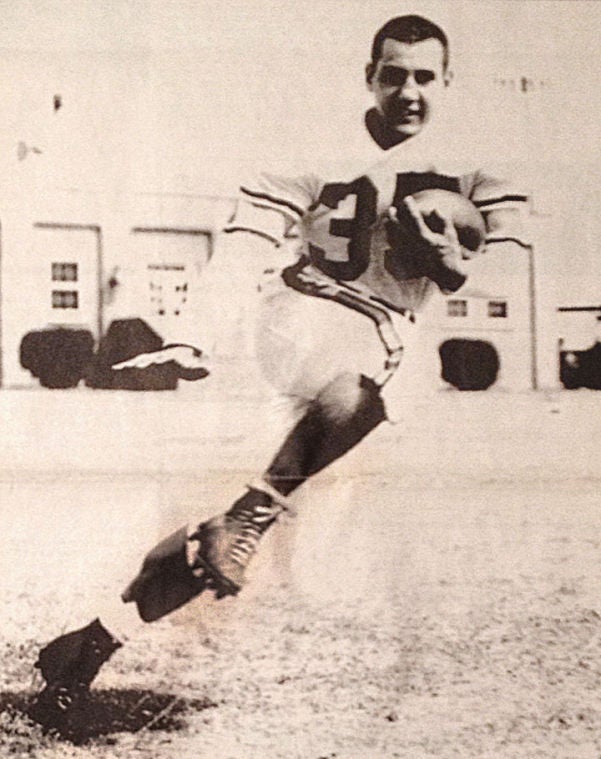Local football legend was role model for many players that came after him
Published 12:00 am Saturday, January 25, 2014
By RYAN ARENA
L’Observateur
LAPLACE — In the ‘90s, televised ads popularized the catchphrase “Be like Mike,” as the accolades and accomplishments of Chicago Bulls superstar Michael Jordan continued to mount.
In the 1940s stellar Leon Godchaux running back Leroy Labat inspired something a bit similar on the local level.
“Later on, it was ‘Be like Mike,’” said Steve Delaneuville. “But back then, in St. John, people wanted to ‘Be like Labat.’”
Funeral services were held Monday evening for Labat, who passed away Jan. 16 after a long illness.
His memory will live on, however, in the minds and hearts of many. Nicknamed “The Black Stallion,” Labat left a great imprint on the history of Louisiana football, standing out at running back for Godchaux and LSU.
“When I was a young boy, Leroy Labat was my hero,” said Delaneuville, who wrote the book “Leon Godchaux High School Football: the 1950s Greatest Teams.” “I think he was a hero to all young boys in St. John Parish. He was my idol.”
East St. John retired the LaPlace native’s jersey number in 2009. In Labat’s senior season at Godchaux in 1948, he led East St. John to its first ever undefeated and untied regular season. He scored 31 touchdowns that season.
“Most of them came from 50 yards or more,” said Delaneuville, who grew to be a close friend of Labat’s. “I think he was the most celebrated football player to ever come out of Leon Godchaux High School.”
Added Emile Hotard, who attended LSU with Labat, “It seemed like every time he had that ball, it ended up being a touchdown.”
Former East St. John coach Larry Dauterive, who manned that position when Labat’s number was retired, said that Labat’s accomplishments speak for themselves.
“We replicated his jersey, hung it right next to Ryan (Perrilloux’s),” said Dauterive. “He was the cat’s meow back then. He used to run those levees to stay in shape when he played for Coach (Joe) Keller.
“The time I spent with him was a pleasure. He had a clear memory, and he was always gracious, always happy to see another football person. The thing about him was that he never bragged about himself or his accomplishments. Others bragged for him. I’m glad we were able to honor him.”
Hotard recalled La bat’s impressive natural strength.
“He was very, very strong,” said Hotard. “He didn’t have to avoid many people, because he’d just knock them over.’
“We had a track meet one time, and he saw the discus and asked Coach Keller, ‘What’s that?’ We didn’t have the discus at the time, I guess. Coach taught Leroy how to throw it, and he took first place. He’d never competed in it before.”
Delaneuville called Labat a “trailblazer,” noting that in the just post-World War II world of 1948, locals having the chance to go to a university like LSU was the exception and not the rule.
“He showed us it was possible,” said De laneuville. “You could get to a college or university and become something special. He was a great inspiration to young men and women.”
Part of Labat’s lore during his time at LSU was the train that would transport fans to games, running through and picking up his fans from Reserve and the surrounding areas.
“He could lose five yards and get a big cheer,” said Hotard. “You might hear a bigger cheer than for another player who gained 10.”
He led LSU in rushing and scoring in 1951 and set what at the time was a single-game school record with 129 yards in a 3-0 victory over Mississippi State.
Off the field, Labat was a friendly man who was full of personality.
“He had time for everybody. They’d have game nights where they’d play Kino, and he’d go socialize. Once you met him, he was your friend. He’d take the time to talk to them and listen to them.’
“Ladies loved Leroy,” Delaneuville continued with a laugh. “The ladies wanted to be with Leroy, and the guys wanted to be like Leroy.”
Labat was a family man, he and his wife Janice raising two sons and a daughter together. He was also a successful businessman.
But on the field, he shed his gentle giant persona. And that’s something those who followed his career won’t soon forget.
“Leroy Labat was agile, mobile and hostile,” said Delaneuville. “That was his running style to a tee.”






